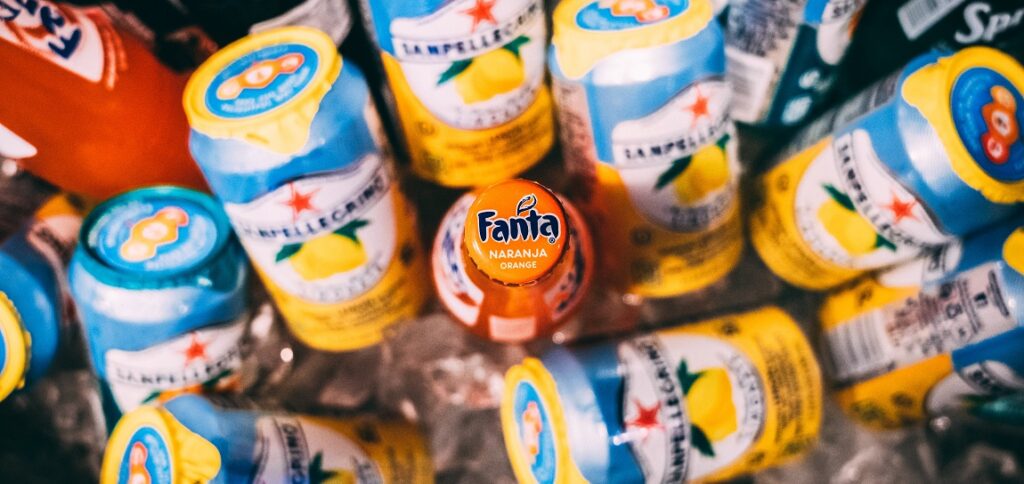Soft drinks in Mexico – Sweet and fizzy

Soft drinks are so deeply embedded in the Mexican culture and diet that they have become part of the dining tradition, from the taco stand to the white-linen restaurant. Whether lunch consists of corn tortillas and beans, or meat in sauces infused with cacao and fragrant spices of Aztec origin, it usually goes with something fizzy. Soft drinks, and especially cola beverages, have become an integral part of Mexican life, even intersecting with politics and religion in certain regions.
Soft drink consumption in Mexico
Mexico is one of the largest global consumers of soft drinks. According to a study by Yale University in 2019, the average Mexican consumes 163 liters of soft drinks annually. This is nearly 40 % higher than in the United States, which is the second highest consumer of soft drinks on a per capita basis.
Carbonated beverages dominate the Mexican soft drinks industry in a major way. Though packaged water and fruit based drinks have also started to gain popularity among Mexican consumers in recent years, carbonated beverages are way ahead of the rest of these categories of the country’s soft drinks market.
Coca-Cola is the most popular soft drink company in Mexico. Although Coca-Cola is popular across Latin America, it is especially so in Mexico. Drinking Coke “is a ritual, like drinking red wine for the French,” is a common refrain in Mexico.
In recent years, the Mexican economy has registered moderate growth rates which have led to reduced real disposable incomes for many consumers. As a result, consumers reduced expenditures, directing their consumption habits toward less expensive brands and purchasing items in smaller and less expensive packages.
The working population of Mexico is largely urbanized, with the majority of people leading busier lives than in the past. As a result, the demand for convenience is playing a major role in the soft drinks markets in Mexico.

Overview of the Mexican soft drink market
COVID-19 impact on the industry
Mexico was one of the worst-hit countries because of COVID-19. The pandemic took its toll on the country’s soft drink industry. The strict lockdown in the country was the main reason for the temporary decline in soft drinks consumption in the second quarter. On March 31, 2020, the Mexican government implemented a nationwide restriction on non-essential economic activities in most municipalities, encouraging the population to stay at home. On April16, the government extended these restrictions to last until May30.

Independent grocery retailers were set to remain the leading retailing channel in 2020, benefiting from being close to the homes of many consumers, allowing less socializing in public and traveling during the outbreak of COVID-19.
Despite the lockdown, Coca-Cola’s sales fell by only 5 % in the second quarter of 2020 in Mexico. That relatively modest decline was caused by the slumping business at restaurants and at street food stalls, where Coke is the ubiquitous (and invariably cheapest) beverage of choice for washing down tacos, tortas, tamales and the like.
Many construction and other manual workers – a key customer segment – have been temporarily laid off since the country’s semi-lockdown began. But apparently, many of these people bought their coke at the store and drank it at home.
Major soft drink producers in Mexico
Coca-Cola Mexico
Coca-Cola had been in Mexico for decades before it started booming in popularity. Coca-Cola rose to popularity in Mexico starting in the 1960s with the help of Vicente Fox, the former president of Mexico, who started his career as a delivery driver for the company. In the early 1970s, an international ad campaign for the drink swept across Mexico. Around the same time, Coca-Cola sponsored the Mexico City Olympics and the World Cup.
Currently, Coca-Cola has almost a cult like following in the country. There are some places where it’s used in religious ceremonies, like at the „Coca-Cola Church“ in the state of Chiapas. It’s really the St. John’s Church, but that’s not what most people call it. A few decades ago, the religious leaders replaced a traditional alcohol with Coke. They use it for a variety of things like decoration and healing, and they drink it in ceremonies.
There is no doubt that Coca-Cola is among the favorite soft drinks in Latin America. However, its success goes beyond the subcontinent’s borders. The North American market highly values the variety produced in Mexico. Fifteen years ago, the glass-bottled and Spanish-labeled Mexican Coca-Cola entered the southwestern United States’ market, with Mexican consumers as its top buyers. The Mexican Coke has become so popular that consumers today pay twice as much for a bottle in cities such as Los Angeles and New York.
Coca-Cola FEMSA, S.A.B. de C.V. is the largest Coca-Cola franchise bottler in the world by sales volume. The Company produces and distributes trademark beverages of The Coca-Cola Company, offering a wide portfolio of 129 brands to a population of more than 265 million.
With over 80 thousand employees, the Company markets and sells approximately 3.3 billion unit cases through close to 2 million points of sale a year through 49 manufacturing plants and 268 distribution centers.
In addition to Mexico, the company’s business operations encompass franchise territories in Brazil, Guatemala, Colombia, and Argentina, and, nationwide, in Costa Rica, Nicaragua, Panama, Uruguay, and Venezuela through its investment in KOF Venezuela.
Arca Continental, S.A.B. de C.V., which has bottling and distribution operations in northern and western Mexico, is the second largest Coca-Cola bottler in Mexico. Over the last five years, the Mexican business (39 % of 2019 sales) grew revenue at an annual rate of 9.8 % with volume growing by 3.9 % per year and average selling price (ASP) increasing by 5.7 % per year.

PepsiCo Mexico
PepsiCo has been present in Mexico for the last 112 years. Grupo Gepp SAPI de CV is PepsiCo’s exclusive Mexico bottler. It produces and distributes company’s international brands Pepsi, 7 Up, Lipton, Gatorade, as well as partner products including Jumex Fresh and Jarritos.
The Company offers both carbonated and non-carbonated drinks, as well as purified water. Grupo Gepp operates in the Central and West Central Mexico and much of the Southeast Mexican Country.
In 2019, PepsiCo announced plans to expand its presence in Mexico with a $4 billion investment. This investment involved construction of a production plant in Guanajuato, its first new Mexican facility in two decades.
“Mexico is our largest operation in Latin America and our second largest worldwide,” Ramon Laguarta, CEO of PepsiCo, had commented on the occasion of announcement of these investments. “It is an honor for us to have a positive impact at all levels of the country’s economy, from the countryside to the corner stores in each location.”
Health issues due to soft drinks?
The industry faces heavy criticism
Seventy-three percent of Mexicans are considered overweight, 34 percent morbidly obese, according to an Organization for Economic Cooperation and Development study published in January 2020. Oaxaca, one of the country’s poorest states, has one of the highest levels of obesity, according to a 2019 Mexican National Health and Nutrition Survey

The huge popularity of soft drinks in the country has also attracted negative criticism of the industry. In one of the most extreme instances of criticism, soft drinks consumption has even been correlated with high number of casualties due to COVID-19 in the country.
According to Jorge Terrazas, general director of ANPRAC, the national soft drink makers association, “In recent years, there has been a consistent attack on the Mexican soft drinks industry in national and international media.
Attempts to stigmatize it have “regrettably” intensified in recent months. These attacks are originating from certain groups that are seeking to establish a narrative of direct correlation between the consumption of bottled beverages and all the serious multifactorial health problems we face as a society. It’s very important to mention that until now, there is no scientific evidence that establishes a relation between heart diseases, obesity and excess weight and the consumption of flavored drinks. The Mexican beverage industry is aware of the obesity problem in the country and is committed to working with society and the government to promote the benefits of a balanced diet and physical activity.”
Measures to reduce soft drink consumption
Sugar tax on soft drinks
The Mexican government approved a sugar tax of 1 peso per liter (roughly 5 US cents) in 2014. The tax on soft drinks is part of a campaign to reduce obesity and diabetes, both of which are serious health issues in Mexico, which has the world’s highest rate of obesity.
After the tax was implemented in January 2014, beverage sales volumes declined for two quarters for coke and one quarter in Pepsi’s case. Years 2015 and 2016, too, witnessed a decline in volumes, but in later years volume started to pick up again. The tax was raised to 1.17 pesos per liter in 2018. Various studies have concluded that the tax has diminished soft drinks consumption in the country by 7.5 %.
Further regulations in certain regions
In 2020, two of the country’s states – Oaxaca and Tabasco – have passed measures to prohibit the sale of sugary drinks to children. In five other jurisdictions in Mexico – the states of Chihuahua, Sinaloa, Hidalgo, Zacatecas and Mexico City – lawmakers have presented proposals to ban or restrict the sale of high-sugar soft drinks to children under 18. Similar bans are being discussed in another nine of Mexico’s 31 states, including in the state of Mexico – the country’s most populous and most densely populated state.
The International Council of Beverages Associations (ICBA) – which represents the interests of the worldwide non-alcoholic beverage industry – has opposed the bans on soft drinks in the country. ICBA has argued that the bans represent an ineffective solution to a complex problem that cannot be attributed to a certain food or beverage.

“The global beverage industry has a strong track record of supporting sensible, science-based regulations around the globe, and taking action to address key challenges like obesity. Over the past six years, our industry in Mexico has reduced calories in beverages by 11 percent per 100 milliliters. In addition, we have pledged to further reduce our calories by an additional 20 percent by 2024,” said Santiago Lopez Jaramillo, the executive director of the ICBA’s Latin America Group.
Emphasis on calorie reduction
Soft drink producers have indeed committed to reducing the calorie content of the drinks they make and sell in Mexico by another 20 % by the year 2024. According to a statement from ANPRAC, “Soft drinks made at the 120 bottling plants we represent will have one-fifth fewer calories by 2024.”
The association noted that its members, among whom are Coca-Cola Femsa, Coke-bottler Arca Continental and Grupo Penafiel, have already reduced calories in their beverages by 55 % over the past 10 years, meaning that some products on shelves in 2024 will have 75 % fewer calories than they originally had.
Future prospects of soft drinks in Mexico
All in all, soft drinks in Mexico are expected to record steady volume growth over the next few years with important new products attracting consumers in an environment where healthier ingredients are becoming a priority. Leading soft drinks companies are set to use more natural sweeteners, which reduce the calorie content while maintaining the flavor.
Want to discover the latest beverage market trends and discuss them with other industry professionals? Then visit us at the next drinktec, which will be held from September 12 to 16, 2022 in Munich.
This article is powered by Verlag W. Sachon.
